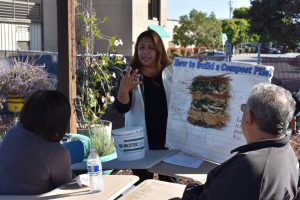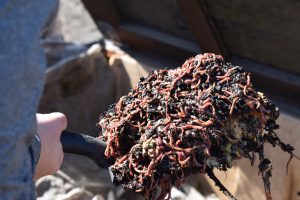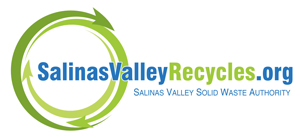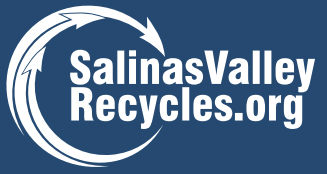Dear Wally,
I hear about climate issues in the news every day and I want to do my part to reduce my impact on the planet but I’m overwhelmed with things I can’t control. I’ve heard that food waste has a huge climate impact when it is landfilled. Composting at home seems like something simple I could do but I’m nervous about starting and have so many questions. How do I begin? I don’t have a yard; can I still do something? Will it smell? If I do worm composting, where do I get worms and how do I keep them alive? Who can teach me what to do?
Please help me!
Thanks,
Hopeful Composter
Dear Hopeful Composter,
You are correct about the impacts of food waste on climate issues. Decomposing organic matter in landfills creates methane gas, a powerful greenhouse gas that is even more effective in trapping heat in the atmosphere than carbon dioxide. All of this trapped heat is what causes the Earth’s atmosphere to warm up. Drew Shindell at NASA’s Goddard Institute in New York estimates that methane gas production (from landfills, cows, coal mines, wetlands, etc.) has been increasing faster than carbon dioxide, and continues to rise. However, methane remains in our atmosphere for only about a decade, so efforts to reduce methane production can provide relatively fast results.
Composting at home is also a decomposing process but it does not create methane gas because of the presence of oxygen. Those with yards have the option to create a compost pile (about 1 cubic yard in size), which may allow composting of a larger volume of materials including yard trimmings, leaves and food scraps. Those with limited space may opt for vermicomposting (composting with worms) ideal for composting household food scraps. Healthy compost systems do not smell bad; they smell like fresh earth. If compost has an unpleasant smell, it may be an indication of too much moisture or not enough air, and these conditions are often easily fixed.
To help residents in the Salinas Valley start their home composting adventures, Salinas Valley Recycles offers free bilingual composting workshops with hands-on instruction, informative takeaway materials, and compost bins and worms available for purchase at reduced rates. Master Composter and Salinas Valley Recycles Resource Recovery Technician Estela Gutierrez leads family-friendly workshops at the Jardin El Sol demonstration garden at the Sun Street Transfer Station in Salinas and throughout the Salinas Valley, nearly every month of the year. Gutierrez encourages bringing children to the workshops stating, “Kids love it, and it provides them an invaluable science and nature experience they can continue at home.” The resulting compost is a nutrient-rich soil amendment to nourish plants and gardens. Even novice composters have commented that composting at home is easier than expected and can be a lot of fun to see the process and the worms thrive!
If composting is out of the question, there are still ways to have a positive impact on climate by reducing the amount of food waste that goes to the landfill. Planning ahead, using what is already in the cupboard and refrigerator, preserving and storing food to last longer, and sharing and donating surplus food all help to keep food waste to a minimum and result in less waste reaching the curb. Throwing out less spoiled or uneaten food also helps the household budget; the U.S. EPA estimates the average individual wastes $400 per year in uneaten food, and that doesn’t include disposal costs.
Additionally, businesses are required by law to repurpose or recycle organic waste if the business produces at least 4 cubic yards of solid waste per week; this minimum reduces to 2 cubic yards of weekly solid waste on January 1, 2020. Any business needing help with compliance may contact Salinas Valley Recycles for free assistance.
My friends at Salinas Valley Recycles are eager to help you with all of your recycling and composting questions at home and at work. Please visit SalinasValleyRecycles.org to learn more and contact them for additional help.
Sincerely,
Wally Waste Not
Ask Wally is presented by Salinas Valley Recycles to answer waste, recycling and disposal questions for the Salinas Valley. Residents and businesses of the Salinas Valley are invited to submit questions via www.SalinasValleyRecycles.org.



